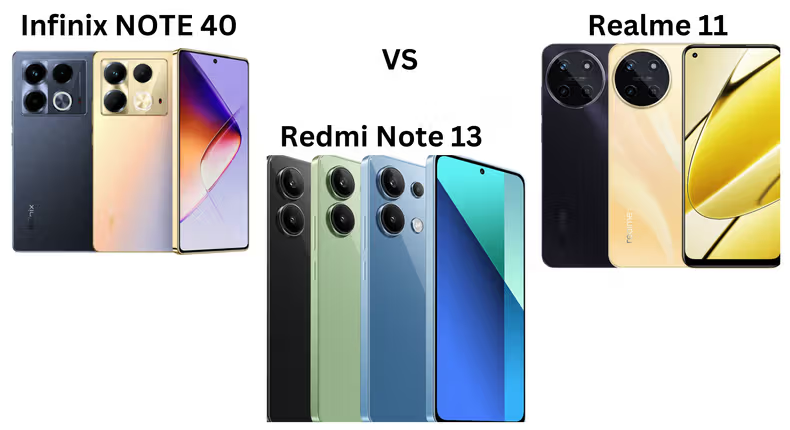The Nigerian smartphone market is becoming increasingly competitive, with several mid-range devices vying for consumer attention.
Notable among them are the Infinix Note 40, Redmi Note 13, and Realme 11. Each brand brings its unique features to the table, striving to claim the title of mid-range champion by offering a balance of performance, design, and practicality. In this comparison, we will take a closer look at these devices and determine which one reigns supreme in a market where quality and functionality are highly valued.
Charging and Battery
Both Redmi Note 13 and Realme 11 maintain a standard with 5000mAh batteries and 33W fast charging. While they provide decent charging speeds, they lack the advanced technology and convenience offered by Infinix’s innovative wireless charging capabilities. The Infinix Note 40 isn’t just equipped with a standard 5000mAh battery; it transforms the charging experience with 45W wired fast charging, which powers up the battery to 50% in just 19 minutes. Furthermore, Infinix elevates the charging game with a 20W wireless MagCharge system, supported by innovative magnetic accessories like the MagCase, MagPad, and MagPower, allowing for effortless charging.
Both the Redmi Note 13 and Realme 11 do not offer wireless charging, placing them a step behind Infinx Note 40 in technological innovation. The wireless charging of the NOTE 40 isn’t just about power; it’s about convenience and ease, allowing users to charge their devices effortlessly. These features are particularly advantageous in Nigeria, where power fluctuations are common, making fast and reliable charging essential.
At a time when other phone brands like Apple and Samsung are progressively eliminating chargers from their packaging, Infinix’s approach undoubtedly wins consumers’ favour.
Design/Display:
With its 6.78-inch FHD+ OLED display, the Infinix Note 40 offers a visually stunning experience, enhanced by a high refresh rate that guarantees smooth scrolling and superior responsiveness. The slim bezels and sophisticated design of the Infinix Note 40 surpasses Redmi Note 13’s 6.67-inch display and the even smaller 6.43-inch screen of the Realme 11, as they fail to maximise the visual impact in the way Infinix Note 40 does.
Camera
The Infinix Note 40’s camera setup is another area where it truly outshines the pack. While the Infinix Note 40 and Redmi Note 13 may share a similar 108MP main camera specification, the Infinix takes a definitive lead with its superior front camera—a 32MP sensor that captures wider, clearer, and more detailed selfies compared to the Redmi’s 16MP and Realme’s 8MP front cameras. This difference is not just in numbers; the quality of selfies and front-facing videos significantly enhances user experience, making the Infinix Note 40 the preferred choice for vloggers and selfie lovers. Additionally, the higher aperture and sensor size on the Infinix ensures better low-light performance and depth in photos, which the Redmi and Realme struggle to match.
The Realme 11, with its 64MP main camera, appears almost antiquated in comparison, lacking both the resolution and advanced features that Infinix users enjoy. It’s clear that when it comes to camera capabilities, Infinix isn’t just playing in the same league; it’s defining it.
OS
While the Redmi Note 13 and Realme 11 offer stable experiences with Android 13, they miss out on the significant advancements that Android 14 brings to the Infinix Note 40. The Infinix Note 40 stands out with the latest Android 14 operating system, complemented by the customised XOS 14 interface.
For Nigerian users, the advancements in Android 14 could mean more efficient data management, which is crucial due to the varying internet speeds and costs of data. Additionally, Android 14’s improved power efficiency features, help users to maximize their device’s battery life.
The Infinix NOTE 40, with its newer OS, may offer a slightly longer lifespan in terms of receiving future Android updates. This aspect is crucial for Nigerian users who prefer devices that remain current with the latest software for more extended periods.
Verdict
In summary, while the Redmi Note 13 Pro has gained attention in the mid-range market, the Infinix NOTE 40 clearly leads the pack. It prioritises essential features that resonate deeply with users—like rapid 45W wired and 20W wireless magnetic charging, alongside a premium design that sets it apart. The Infinix NOTE 40 is designed for efficiency and convenience, surpassing its competitors who still cling to more traditional, slower charging methods. It does not burden users with superfluous features but instead presents a streamlined, premium design that is both functional and stylish, clearly setting it apart from the crowd. With its well-rounded offering, it takes the crown as a midrange killer without any real weaknesses.
| Feature | Infinix Note 40 | Redmi Note 13 | Realme 11 |
|---|---|---|---|
| Display | 6.78″ FHD OLED, 2.5D, 120Hz | 6.67″ FHD OLED, Straight Screen | 6.43″ FHD OLED, Straight Screen |
| Processor | Helio G99 | Snapdragon 4GEN1 | D6020 |
| Charging | 45W Wired, 15W Wireless, 5W Wireless Reverse | 33W Wired | 33W Wired |
| RAM | 8 GB | 8 GB | 8 GB |
| ROM | 256 GB, 128 GB | 256 GB, 128 GB | 256 GB, 128 GB |
| Main Camera | 108MP + 2 + Q | 108MP | 64MP |
| Front Camera | 32MP | 16MP | 8MP |
| Battery | 5000mAh | 5000mAh | 5000mAh |
| Fingerprint | In-Display Screen | In-Display Screen | In-Display Screen |
| Other Features | BT 5.3, Type C (Support PD Agreement), Beyblade, Dual speaker, 10W NFC, 10W OTG, IP53, Dual mic + AI Noise Reduction, 15W Magnetic Tempered Glass film | Leather Appearance | Leather Appearance |
—

